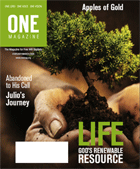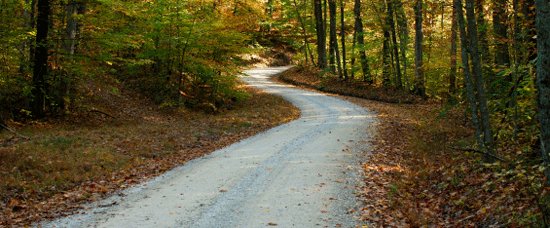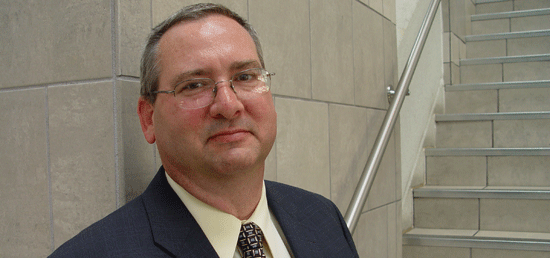
Life: God's Renewable resource
|
 |
Curve in the trail
by Brenda Evans
Find out more about the benefits of planned giving at www.fwbgifts.org or contact the Free Will Baptist Foundation at (877) 336-7575.
|
PIG TRAIL WAS DANGEROUS, even for a risk-taker. Give a boy two wheels attached by a few steel rods, a set of handlebars, a dare-devil cousin, a curvy mountain path, and you have trouble. Not that David liked trouble. He did, however, like taking risks and still does unless it involves finances.
Narrow, steep, and curvy, Pig Trail was a dirt path for animals with four feet—not boys on Stingray bikes. But David and his cousin Steve saw great potential for fun and danger on that path down the side of one of those Ouachita Mountains in Malvern, Arkansas.
Speed and thrills are worthy goals for a young boy. David was up to the challenge, willing to endure the struggle up for the exhilarating ride down. He knew what to do: skillfully peddle, lean, turn, skid, evade, and above all have no fear. Undoubtedly, his skill would take him down safely—he hoped.
Unfortunately, David and his cousin had not figured on what a young boy might call “the luck of the curve.” And so they streaked on, weaving, wobbling, reveling. The curve was steep and sharp; the crash sudden and messy, a mangled mishmash of metal, rubber tires, and boy flesh. They understood why early makers of bicycles had called them bone-shakers. Picking up the pieces, they fixed what needed fixing and limped home.
Bigger Curves
David Brown is now 50, far away in both age and experience from his Pig Trail days on the banana seat of a Stingray bike. Yet to this day, he occasionally is a risk-taker and always a fixer. In fact, cycling, as he now calls it, is in some ways an analogy for his life.

At age 14, he knew that the Lord had placed a special calling on his life. He did not know the specific direction it would take. Nor did he know that there would be more dangerous curves along the way.
“I almost died when I was 20,” David says. “I passed out in a college classroom because I had lost so much blood. My friends Randy Riggs and Tim Landers picked me up and carried me outside.”
“At 20 I thought I was indestructible. I’d always considered myself a fixer—if there was a problem I would take care of it. And I thought that’s what the doctor would do with this. Besides, 20-year-olds don’t die. Looking back on it now, I know that’s not true.” After a diagnosis of perforated intestine caused by Crohn’s Disease, David underwent complicated surgery and more life-threatening blood loss, but eventually he recovered fully with no recurrences.
Although that near-death experience was more sobering than a bad curve on Pig Trail, not surprisingly, David found a way to get a laugh out of it: “Randy Bryant (now secretary of the National Association of Free Will Baptists) was my roommate at the time, and I still tease him about being the roommate that almost killed me.”
After that curve in his life, David picked himself up, let the Lord fix what needed fixing, and finished his bachelor’s degree in 1979. He enrolled in a program in accounting at Tennessee State University, finished the coursework, sat for the CPA exam, and began a brief stint in public accounting. In May 1992, he joined the staff of the Board of Retirement and the Foundation as their accountant. In August of 2007, he became the Foundation’s third director.
But those years held other turns. By 1997 he and his wife Temisia had two children, a boy and a girl—four-year-old Reese and baby Adra. “Adra was born with a heart condition called Tetralogy of Fallot. At three months, the doctor didn’t like the oxygen levels in Adra’s blood, so he wanted to operate. Usually surgery is delayed until about six months or even later, but Adra’s oxygen levels were bad,” David says.
And so at three months of age and a little more than eight pounds in weight, Adra underwent heart surgery to repair a displaced aorta, narrowed pulmonary valve, a hole in the ventricular septum and a thickened wall in the right ventricle. David had not expected this kind of curve in a life that had seemed to be moving just fine.
“Her heart was no larger than her tiny fist. I couldn’t imagine doing this. The hardest thing for me was the question—what am I supposed to do? I like to fix things, fix problems, and I’d always been able to do that. What I learned with Adra was that sometimes there is nothing for me to do. Sometimes God needs to do it.”
Learning to Let Go
Taking his own hands off the handlebars of his life was not easy, for it was entirely about trust—turning loose of the control and letting the Lord negotiate the risky road ahead. But David did it. And so he, Temisia, and young Reese trusted and waited. Today, Adra is almost eleven. She’s healthy, thriving, and able to pedal her own bike.
As director, David (pictured below) has the oversight of $38 million at the Foundation, but he still cycles. These days he rides a Gunnar 27-speed bicycle with three chain rings on the crank and nine sprockets on the rear hub. The steel Gunnar, weighing less than 22 pounds, is certainly a different machine than a Stingray. It is made for speed and distance, not for Pig Trail.

“Sometimes I go as fast as I can for distances of less than 20 miles. It’s called time trialing. At other times, I’m working on distance, not speed. Then I’ll cycle for 40 or more miles, training for endurance and stamina. Stressing my body, de-stresses my mind,” he says. Besides, he sees the parallel to his personal and professional life.
David keeps his mission and the mission of the Foundation focused and purposeful just like his cycling. As director, he says it is about two main things: people and money. And he has settled into the saddle of this vehicle, ready for both the time trial and the distance.
“It’s easy to talk to people about money,” he says. “When they come to me, my job is not to tell them what to do with their money. My job is to find out what they want to accomplish and then show them how to do it.” In some ways the work of the Foundation is as simple as that.
“We are the planned giving arm of the denomination. That means that we help individual, churches, and denominational agencies plan how to best use their financial resources.” David sees this ministry as parallel to a cyclist’s concentration on the road—looking ahead with clear unobstructed vision and purpose.
“We must think and plan ahead. What we are doing today impacts what we can do tomorrow both as individuals and as a denomination. For example, if our denomination builds a strong support base of endowments, we can underwrite the administrative costs of our various ministries in the future. Hopefully in the next 20, 30, or even 50 years from now we may accomplish this goal. At that point, on-going gift income can be used to grow the work of each ministry while endowments pay the administrative costs.
“Both as individuals and as a denomination, we have come to this concept late in the race. Look at large institutions such as Harvard and Yale—over 30 percent of their operating costs come from endowments. In the past we have concentrated almost entirely on fundraising for current needs; now we are beginning to look ahead, around the next curve, to underwriting the future of our departments’ ministries. Individuals and families see what trusts and other agreements can do for them. It is an exciting time.”
David is both determined and realistic about the importance of the work of the Foundation: “This approach—planning today for tomorrow—is crucial to our continued growth both as a denomination and as individuals. That is why the service the Foundation offers is so important for us all.”
“We are here to serve our people. We want to get our message out, a message that is especially timely for people 50 and older. We are available. Our pledge is to serve with financial integrity and expertise.”
David is focused and prepared for the course ahead, for the time trials and for the distance. Cycling has taught him that time trials improve his endurance and distance training improves his speed— it takes both to get the job done.
Brenda Evans is a retired English teacher, mother of three, and grandmother of seven. She and her husband Bill live in Nashville, TN. To learn more about the Free Will Baptist Foundation, call (877) 336-7575 or visit www.fwbgifts.org.
|
|

